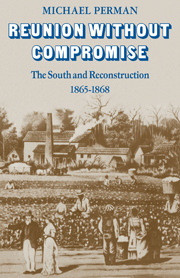Book contents
- Frontmatter
- Contents
- Preface
- Part I Conciliation and conflict
- Introduction: Reconstruction as reconciliation
- 1 Defiant optimism
- Part 2 Encouraging Southern loyalty, 1865
- Part 3 Seeking Southern cooperation, 1866
- Part 4 Demanding Southern acquiescence, 1867–1868
- Epilogue: The irrelevance of the moderates, 1865–1868
- Appendix: Registration and voting statistics for the Southern State Constitutional Conventions, 1867–8
- A note on sources
- Index
- Frontmatter
- Contents
- Preface
- Part I Conciliation and conflict
- Introduction: Reconstruction as reconciliation
- 1 Defiant optimism
- Part 2 Encouraging Southern loyalty, 1865
- Part 3 Seeking Southern cooperation, 1866
- Part 4 Demanding Southern acquiescence, 1867–1868
- Epilogue: The irrelevance of the moderates, 1865–1868
- Appendix: Registration and voting statistics for the Southern State Constitutional Conventions, 1867–8
- A note on sources
- Index
Summary
The South under Northern scrutiny
‘The most important feature attending the regeneration of these States is the temper and disposition of the Southern people.’ This was the conclusion of a Chicago Tribune editorial published on 26 April 1865. But although the Tribune was a newspaper associated with the radical wing of the Republican Party, this observation corresponded with the assumptions and priorities of a broad spectrum of Northern opinion-makers and politicians in the early days after Appomattox. It was generally agreed that before proposals could be formulated for dealing with the Confederate States, the attitudes and feelings prevailing there had to be known. Thereby a policy based on evidence rather than ignorance could be devised, with a greater hope that it might eventually succeed. Implicit in the Tribune's comment and in this general approach was a second assumption: that, if possible, the leaders of the Confederacy should be involved in the intersectional adjustment. Terms would be proposed to which the former Confederates would give their assent and compliance; no matter whether the details were harsh or lenient, settlement would not be long-lasting or even possible, it was felt, if the South's leaders were bypassed.
Some in the North hoped with Horace Greeley and his New York Tribune that they could make an ‘Appeal to the statesmen of the South.’.
- Type
- Chapter
- Information
- Reunion Without CompromiseThe South and Reconstruction: 1865–1868, pp. 13 - 54Publisher: Cambridge University PressPrint publication year: 1973

